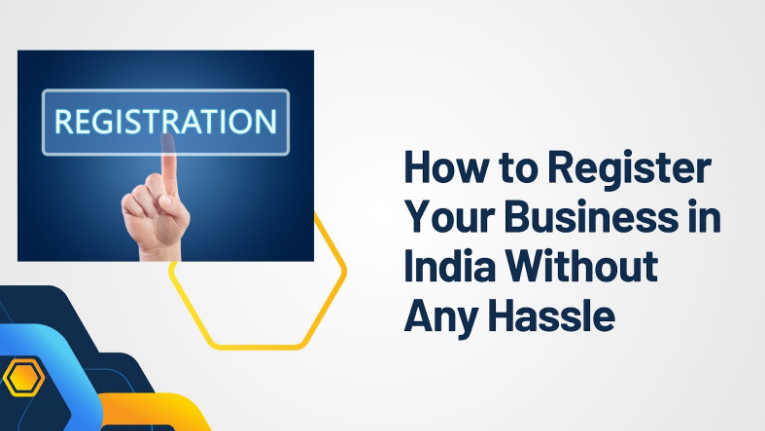Starting a business in India is an exciting and rewarding journey, but the process of registration can seem complex and overwhelming for many entrepreneurs. Understanding the necessary steps and documents required can simplify the entire process, making it less daunting. In this guide, we will walk you through the steps to register your business in India without any hassle.
Understanding the Types of Business Entities in India
Before you begin the registration process, it’s essential to understand the different types of business structures available in India. The choice of business entity will determine the legal formalities and tax implications for your business. Here are the most common types:
- Sole Proprietorship: This is the simplest form of business structure, ideal for small-scale businesses with a single owner. It is easy to set up, but the owner is personally liable for any debts or liabilities.
- Partnership Firm: In this structure, two or more people share ownership and responsibility. It requires a partnership deed, and the liability is joint.
- Limited Liability Partnership (LLP): An LLP offers the flexibility of a partnership but limits the liability of the partners. It is ideal for small and medium businesses and requires a minimum of two partners.
- Private Limited Company: This is one of the most popular business structures in India. A private limited company provides limited liability protection to its shareholders, making it a good choice for growing businesses. It requires at least two directors and shareholders.
- Public Limited Company: This is suitable for large-scale businesses that plan to raise capital from the public by issuing shares.
Each business structure has its own set of advantages, limitations, and requirements, so choosing the right one depends on your business goals, size, and industry.
Step-by-Step Guide to Registering Your Business
1. Choose a Business Name
The first step in registering your business is selecting a unique name. The name should reflect your business and be easy for customers to remember. Ensure that the name complies with the naming guidelines set by the Ministry of Corporate Affairs (MCA) and is not already registered by another entity. You can check the availability of the name through the MCA website.
2. Apply for Digital Signature Certificate (DSC)
A Digital Signature Certificate (DSC) is mandatory for filing forms online with the Ministry of Corporate Affairs (MCA) for the registration of most types of business entities. It acts as a legal signature in digital format and is required for authorized signatories of the business. You can obtain a DSC from government-approved agencies.
3. Obtain Director Identification Number (DIN)
For companies and LLPs, every director must have a Director Identification Number (DIN). This is a unique number assigned to individuals intending to become directors in a company. You can apply for DIN through the MCA portal during the business registration process.
4. Register for Goods and Services Tax (GST)
If your business turnover exceeds the prescribed limit (currently ₹40 lakhs for most businesses), you must register for Goods and Services Tax (GST). GST registration is necessary for businesses involved in the supply of goods and services and ensures compliance with tax regulations. You can register for GST online through the GST portal.
5. Choose the Type of Business Entity and Apply for Registration
Once you’ve chosen the appropriate business structure and gathered the necessary documents, you can proceed with the registration. Here’s a brief overview of the registration processes for each type of business entity:
- Sole Proprietorship: You need to register for a GST number and obtain other licenses based on your business type, such as a trade license from the local municipal authority.
- Partnership Firm: To register a partnership firm, you need to draft a partnership deed and file it with the Registrar of Firms. You will also need to obtain a PAN card and GST registration.
- Limited Liability Partnership (LLP): For LLP registration, file an application with the MCA, along with documents like the LLP agreement and identity proofs of partners. The process is online, and you will receive a Certificate of Incorporation once your LLP is registered.
- Private Limited Company: To register a private limited company, you must submit the following documents to the MCA:
- Memorandum of Association (MOA) and Articles of Association (AOA)
- Identity and address proof of directors and shareholders
- Registered office address proof
- PAN card of directors
- The application for the company name and its availability After successful submission, you will receive a Certificate of Incorporation.
- Public Limited Company: The process for registering a public limited company is similar to a private limited company, but it involves more stringent compliance and requires a minimum of three directors and seven shareholders.
6. Obtain Other Necessary Licenses and Permits
Depending on your type of business, you may need additional licenses or permits. Some common ones include:
- Trade License: Issued by the local municipal authority, this license ensures that your business complies with local laws and regulations.
- Shops and Establishment Act Registration: Mandatory for businesses operating in commercial spaces, this registration is issued by the local labor department.
- Import Export Code (IEC): If your business deals with international trade, you must apply for an IEC with the Directorate General of Foreign Trade (DGFT).
- FSSAI Registration: If your business is involved in food manufacturing, processing, or distribution, you need to obtain a Food Safety and Standards Authority of India (FSSAI) license.
- Trademark Registration: To protect your brand name and logo, it’s advisable to register a trademark with the Trademark Registry.
7. Open a Business Bank Account
After successfully registering your business, open a separate business bank account. This is important for maintaining clear financial records, managing business transactions, and building credibility. To open an account, you will need your business registration documents, proof of identity, and address proof of the business.
8. Maintain Compliance
Once your business is registered, it’s important to stay compliant with the various regulatory requirements such as filing annual returns, maintaining accounts, paying taxes, and renewing licenses. Regular compliance ensures that your business runs smoothly and avoids any legal issues in the future.
Conclusion
Registering a business in India may seem like a complicated task, but by understanding the necessary steps and preparing in advance, the process can be straightforward and hassle-free. Choose the right business structure, gather the required documents, and follow the registration procedure to officially start your business. Once registered, stay compliant with local laws and regulations to ensure long-term success and growth.














